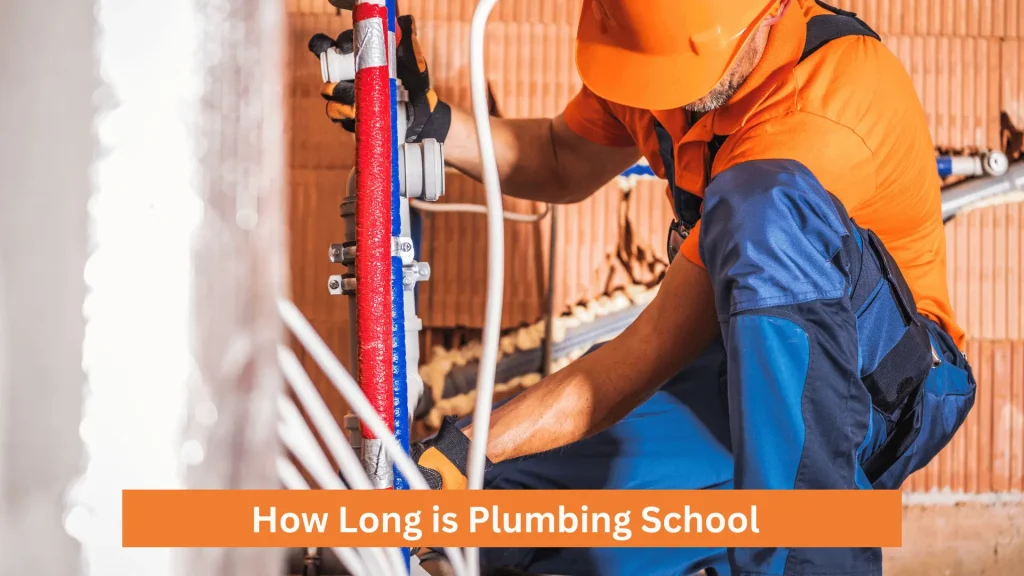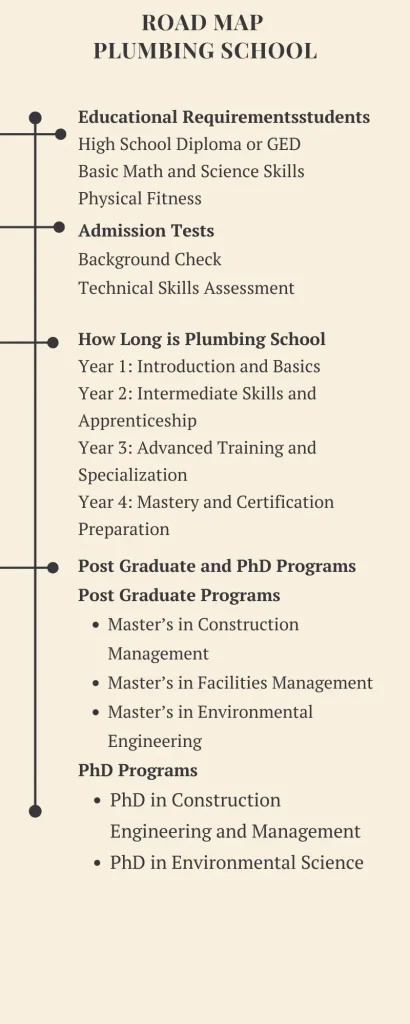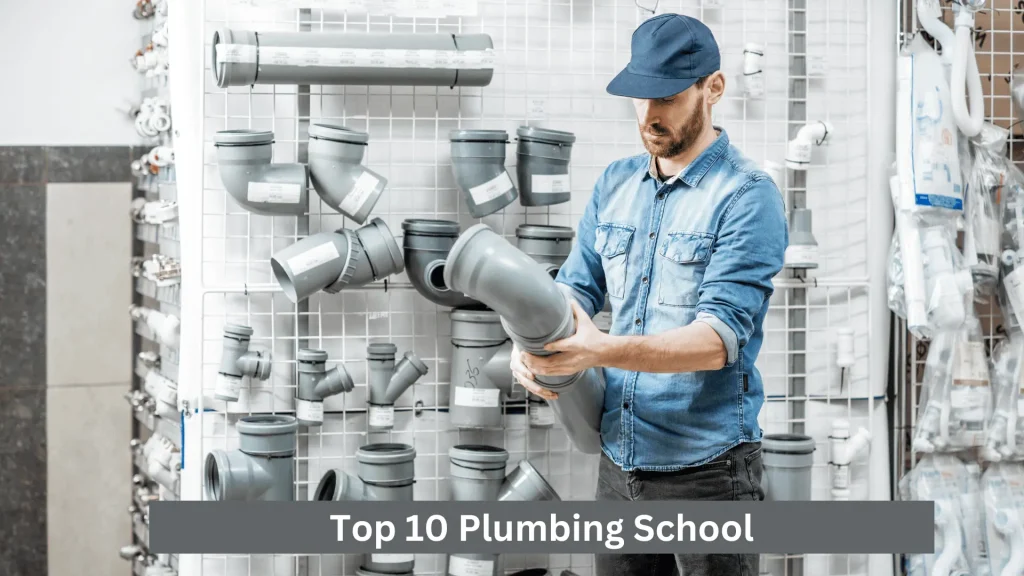How Long is Plumbing School
How Long is Plumbing School? Plumbing programs typically last between six months to two years, depending on whether you pursue a certificate or an associate degree. Some apprenticeships may extend this time. These programs combine classroom instruction with hands-on training, preparing students for a career in plumbing.
What is Plumbing School
Plumbing school provides the essential education and training for individuals aiming to become professional plumbers. These programs cover a wide range of topics, including pipe installation, plumbing codes, and system maintenance. Students learn through a combination of classroom instruction and hands-on experience, ensuring they are well-prepared for the practical demands of the job.

In plumbing school, students also receive training in safety procedures, blueprint reading, and the use of specialized tools. This comprehensive curriculum is designed to equip future plumbers with the skills necessary to diagnose and repair various plumbing issues. Graduates are prepared to enter the workforce with the knowledge and experience needed to succeed in this essential trade.
How Long is Plumbing School
Year 1: Introduction and Basics
In the first year, students focus on foundational skills and knowledge. Coursework typically includes basic plumbing principles, safety practices, and an introduction to plumbing tools and equipment. Students also learn about plumbing codes and regulations, basic math for plumbing, and blueprint reading. Hands-on training begins with simple tasks, such as pipe cutting and fitting.
Year 2: Intermediate Skills and Apprenticeship
The second year delves into more complex plumbing systems and techniques. Students learn about residential and commercial plumbing, water supply systems, and waste disposal systems. Coursework includes advanced topics such as fixture installation, water heaters, and drainage systems. This year often includes an apprenticeship component, where students gain practical experience under the supervision of experienced plumbers.
Year 3: Advanced Training and Specialization
In the third year, students may choose to specialize in a particular area of plumbing, such as green plumbing technologies, industrial plumbing, or plumbing design. Advanced courses cover topics like hydronic heating systems, backflow prevention, and gas piping. Apprenticeships continue, allowing students to apply their knowledge in real-world settings and develop expertise in their chosen specialization.
Year 4: Mastery and Certification Preparation
The final year focuses on mastering plumbing skills and preparing for certification exams. Students refine their techniques and gain experience in troubleshooting and repairing complex systems. Coursework may include project management, customer service, and business practices for those interested in starting their own plumbing business. Upon completion, students are ready to take industry certification exams and enter the workforce as qualified plumbers.

How to Enter Plumbing School
Educational Requirements
High School Diploma or GED: Most plumbing programs require applicants to have completed high school or obtained a General Educational Development (GED) certificate.
Basic Math and Science Skills: A good understanding of mathematics, especially algebra and geometry, is important. Basic knowledge of physical sciences, such as physics and chemistry, is also beneficial.
Physical Fitness: Plumbing is a physically demanding job, so applicants should be in good physical condition and capable of performing manual labor.
Entry Tests
Aptitude Tests: Some plumbing schools may require applicants to take an aptitude test that assesses their mathematical skills, mechanical reasoning, and spatial relations.
Interview: An interview may be part of the entry process to assess the applicant’s interest in and suitability for the plumbing trade.
Background Check: Some programs might conduct background checks to ensure the suitability of the candidate for apprenticeship placements.
Application Process
Research and Choose a Program: Applicants should research various plumbing schools and programs to find one that suits their needs and career goals.
Complete Application Form: Fill out the application form provided by the school, which may be available online or in person.
Submit Required Documents: Provide necessary documentation, such as high school transcripts, GED certificates, and any other required certifications or test scores.
Application Fee: Pay any application fees that the school requires.
Interview: Attend an interview if required by the program.
Financial Aids
Scholarships: Many schools and external organizations offer scholarships based on academic merit, financial need, or other criteria. Research and apply for these scholarships.
Grants: Federal and state grants, such as the Pell Grant, may be available to eligible students. These grants do not need to be repaid.
Student Loans: Federal and private student loans can help cover tuition and other expenses. Be aware that loans must be repaid with interest.
Work-Study Programs: Some schools offer work-study programs that allow students to earn money while gaining work experience in their field of study.
Apprenticeship Stipends: Some apprenticeship programs provide stipends to help offset living expenses while you are learning on the job.
Researching and understanding these components can help prospective plumbing students navigate the application process and secure the necessary funding for their education.
Postgraduate and PhD programs
Postgraduate and PhD programs specifically for plumbing are rare, as plumbing is typically considered a trade rather than an academic discipline with advanced degree options. However, there are related pathways and advanced education opportunities that can enhance a plumbing career:
Postgraduate Programs
1. Master’s in Construction Management
Overview: Focuses on advanced project management, leadership, and construction practices, which can be valuable for plumbers who want to advance to managerial roles or oversee large-scale projects.
Core Subjects: Project planning, risk management, cost estimation, and sustainable construction practices.
2. Master’s in Facilities Management
Overview: Provides skills in managing and maintaining large facilities, which can be beneficial for plumbers working in commercial or industrial settings.
Core Subjects: Facility operations, maintenance management, and building systems.
3. Master’s in Environmental Engineering
Overview: Covers topics related to environmental systems and sustainability, which can be relevant for plumbers interested in green plumbing and sustainable practices.
Core Subjects: Water treatment, waste management, and environmental impact assessment.
PhD Programs
1. PhD in Construction Engineering and Management
Overview: Focuses on research in construction techniques, project management, and innovations in building practices, which can benefit experienced plumbers aiming to contribute to industry advancements.
Core Subjects: Advanced project management, construction technology, and research methodologies.
2. PhD in Environmental Science
Overview: For plumbers interested in contributing to environmental research and development, particularly in areas like water conservation and waste management.
Core Subjects: Environmental policy, water resource management, and environmental technology.
Top 10 Plumbing Schools
Here are ten top plumbing schools or programs known for their excellence in plumbing education and training:

1. Penn Foster Career School
Location: Online
Overview: Offers a comprehensive online plumbing diploma program with a focus on residential and commercial plumbing skills, code compliance, and system design.
2. The Plumbing Academy
Location: Los Angeles, California
Overview: Provides hands-on training and classroom instruction in plumbing fundamentals, advanced techniques, and industry certifications.
3. Southern Crescent Technical College
Location: Griffin, Georgia
Overview: Offers a well-rounded plumbing program with both classroom instruction and practical experience. Features include certifications and apprenticeships.
4. Rochester Institute of Technology (RIT)
Location: Rochester, New York
Overview: Provides a specialized plumbing program through its Applied Technology department, focusing on advanced plumbing systems and building codes.
5. California State University, Long Beach (CSULB)
Location: Long Beach, California
Overview: Offers a plumbing technology program that emphasizes both technical skills and management practices for those looking to advance in the field.
6. Illinois Central College
Location: Peoria, Illinois
Overview: Features a comprehensive plumbing technology program that includes hands-on training and preparation for industry certification exams.
7. Tarrant County College
Location: Fort Worth, Texas
Overview: Provides an extensive plumbing program with training in residential and commercial plumbing, code compliance, and safety practices.
8. Cincinnati State Technical and Community College
Location: Cincinnati, Ohio
Overview: Offers a Plumbing Technology program that includes both classroom learning and practical, hands-on experience in a state-of-the-art facility.
9. Purdue University
Location: West Lafayette, Indiana
Overview: Known for its strong focus on engineering and technology, Purdue offers courses related to plumbing systems and infrastructure as part of its broader construction management and engineering programs.
10. Wyoming Technical Institute
Location: Laramie, Wyoming
Overview: Offers a specialized program in plumbing technology with a focus on hands-on training and real-world application of plumbing skills.
Factors Affecting the Length of Plumbing School
The length of plumbing school can vary based on several factors. Here are the key factors that influence how long it takes to complete plumbing education:
1. Type of Program
Certificate Programs: Typically last from 6 to 12 months and focus on basic plumbing skills and knowledge.
Diploma Programs: Generally span 1 to 2 years, offering more comprehensive training and sometimes including hands-on experience.
Associate Degree Programs: Usually take 2 years to complete and include a broader range of subjects, including plumbing systems, safety, and management.
2. Full-Time vs. Part-Time Enrollment
Full-Time: Students who enroll full-time can complete their program more quickly, often in less than a year for certificates or 2 years for associate degrees.
Part-Time: Part-time students, who may be working or have other commitments, may take longer to complete their studies, potentially extending the duration by an additional year or more.
3. Program Structure
Classroom vs. Online: Online programs might offer flexible pacing but could take longer if students are balancing other responsibilities. In-person programs often have a set timeline.
Hands-On Training: Programs with extensive hands-on training or apprenticeship components may extend the overall length of the program due to additional time spent on practical experience.
4. Apprenticeship Requirements
Apprenticeships: Many plumbing programs include or require an apprenticeship, which can add 1 to 5 years to the overall education timeline. Apprenticeships provide practical, on-the-job training but lengthen the time before full qualification.
5. Previous Experience and Education
Prior Knowledge: Students with prior experience or education in related fields may complete their programs more quickly if they can waive certain courses or receive credit for their experience.
Advanced Standing: Some programs offer advanced standing options for students who have relevant industry experience or certifications, potentially shortening the duration of their studies.
Final Verdict
The length of plumbing school varies based on the type of program, enrollment status, and additional factors like apprenticeships. Choosing the right path depends on individual goals and commitments, with options ranging from quick certificates to comprehensive associate degrees.
FAQs
1.How long does it take to complete a plumbing certificate program?
Typically 6 to 12 months, depending on the program and full-time or part-time status.
2.What is the difference between a plumbing diploma and an associate degree?
A diploma usually takes 1 to 2 years and focuses on core skills, while an associate degree covers a broader range of topics and may take 2 years.
3.Do plumbing programs include apprenticeships?
Many programs include apprenticeships, which can extend the overall training time by 1 to 5 years.
4.Can prior experience shorten the duration of plumbing school?
Yes, previous experience or related certifications may allow students to complete their program faster by waiving certain courses.
5.How do state regulations affect plumbing school length?
State and local regulations may influence the educational requirements and certification process, impacting the duration of training needed.
